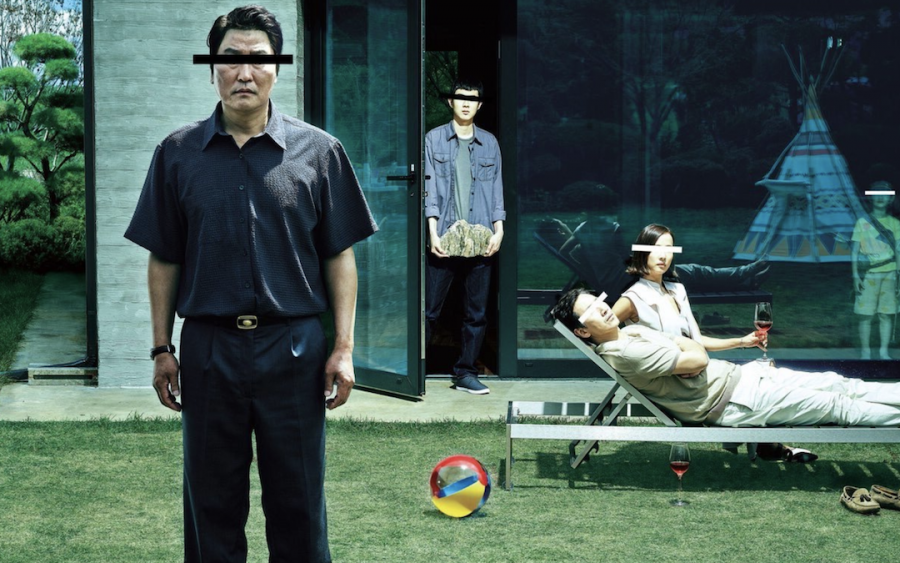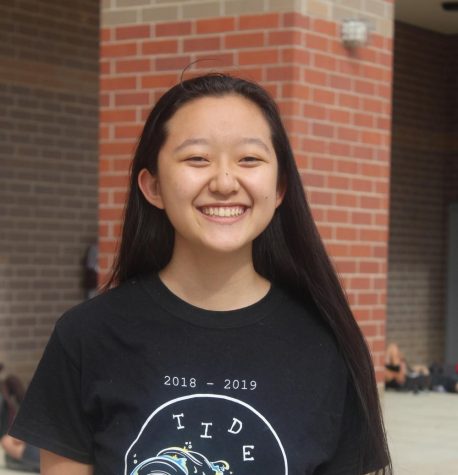“Parasite”: A must-see action-packed thriller
Not only does the movie Parasite thrill, it also explores deeper themes of class.
November 19, 2019
If you’ve seen the trailer for “Parasite” and felt terribly confused afterwards, you wouldn’t be the only one. Each clip gives snatches of dialogue that feel impossible to follow, with little to no explanation of who any of the characters are, and as the cuts from sequence to sequence get faster and the soundtrack picks up, you’re not quite sure of anything except that someone has some nefarious plot, which is not much of a premise at all. But worry not, the vivid cinematography and glowing reviews don’t lie: “Parasite” will keep you gripped from beginning to end.
Released May 30 in South Korea and Oct. 11 in the U.S., “Parasite” is the newest film from South Korean director Bong Joon-ho, who formerly directed “The Host” (2006) and “Snowpiercer” (2013), two of the highest-grossing South Korean films of all time. However, “Parasite” has already surpassed the grossing of both these films and has also won the Palme D’Or at the 2019 Cannes Film Festival, the first Korean film to do so and the first to do so with a unanimous vote since “Blue is the Warmest Colour” in 2013.
In this dark comedy thriller, the Kims are a family of four living in their semi-basement apartment, making their living folding pizza boxes. The son, Kim Ki-woo (played by Choi Woo-shik), accepts an offer from his friend to tutor a rich girl, getting his sister Kim Ki-jeong (Park So-dam) to fabricate documents indicating that he is a college student. Through questionable but unique tutoring techniques, Ki-woo gains the trust of the rich girl’s family, the Parks, and schemes to open up hired positions in the household for the rest of his family members as well.
There’s much more to the film, but it’s difficult to reveal much else without spoilers. Bong masterfully navigates through the wild rollercoaster of the plot, leaving us with a fascinating social commentary on class relations and whether it is ever possible to bridge the gap between rich and poor, or if the two are simply irreconcilable. Despite both the Kims and the Parks placing family first, the Parks almost have the luxury of antagonizing each other, while the Kims must continually support each other in their desperate attempts to survive.
These major themes of social class and family, further supported by other complex family relations in the film, pervade the storyline in its entirety, providing an underlying sense of continuity even when onscreen, everything seems to be going off the rails. Even as the working class relies on the rich for income to survive, the real parasitism lies in the reliance of the upper class on workers and the expectation that the working class do anything to support the rich.
“Parasite” is truly emblematic of the dark comedy genre; Bong presents even the bleakest moments in a potentially humorous light, whether that be through slow-motion, slight overacting or just goof-ups from the Kims that feel like they might belong in a sitcom instead of an award-winning thriller. This is also due to the stellar acting: Choi Woo-shik’s sleepy-eyed expression and repeated cries of “This is so metaphorical!” are enough to send me into a fit of laughter. The actors nailed the realism in their family dynamics; no matter how deep the Kims’ transgressions, the strength of their familial bonds alone make you want to root for them to finally make it out of that semi-basement.
Every shot is aesthetically gorgeous, but the film really shines in the long shots, with no cuts to interrupt the actors’ performances; that the acting and mise-en-scene alone can maintain the audience’s interest is a feat in itself. The overwhelming gray hues of the Kims’ semi-basement and the bright tones of the Parks’ mansion make the socioeconomic contrast as clear as day, but the nuances in the lighting hint at the limitations of each setting.
The film seems to settle in as it goes along; the pacing in the beginning feels rather rushed, and some pieces of dialogue feel shoehorned in just to move the plot along, rather than inserted naturally. I also would’ve liked to see a deeper exploration of the complex relationships between family members and also those between members of each family, mainly Ki-woo and Park Da-hye (Jung Ji-so), as the film seems to introduce interesting nuances without following through. However, the pacing after the first 30 minutes or so was perfect, and seeing as the film is already two hours and 12 minutes long, it can be forgiven for not fully fleshing out every idea that was introduced.
Overall, “Parasite” absolutely lives up to the hype for me, with strong themes, excellent acting and sheer wow factor. As long as you’re willing to read subtitles the whole time, I would highly recommend watching the film in theaters while you still can. If you’re as easily scared as I am, maybe just be prepared to look away from time to time. It’s absolutely worth it for the experience of the rest of the film.



